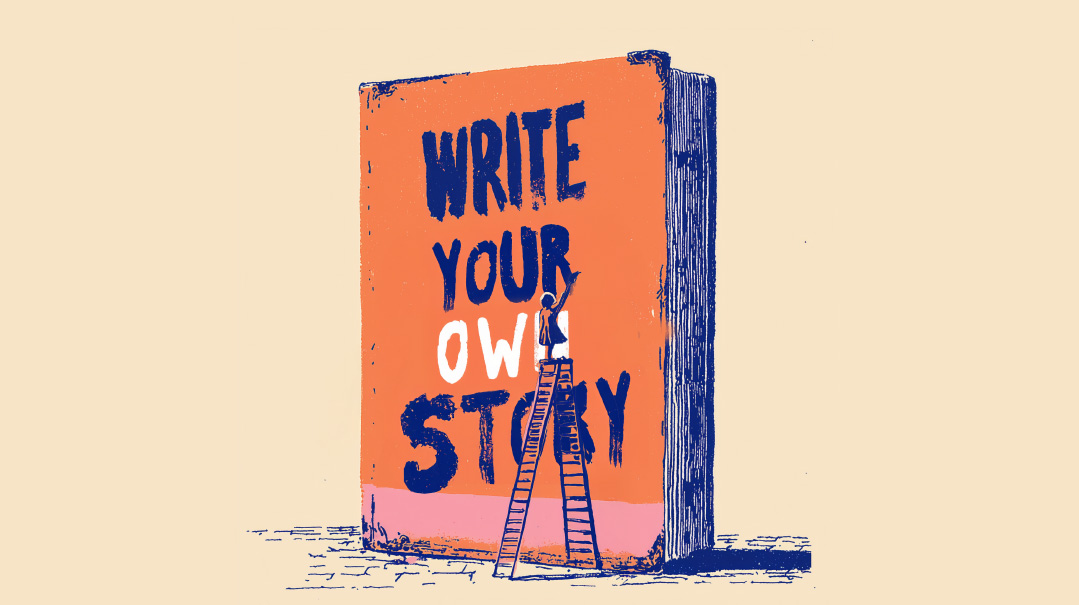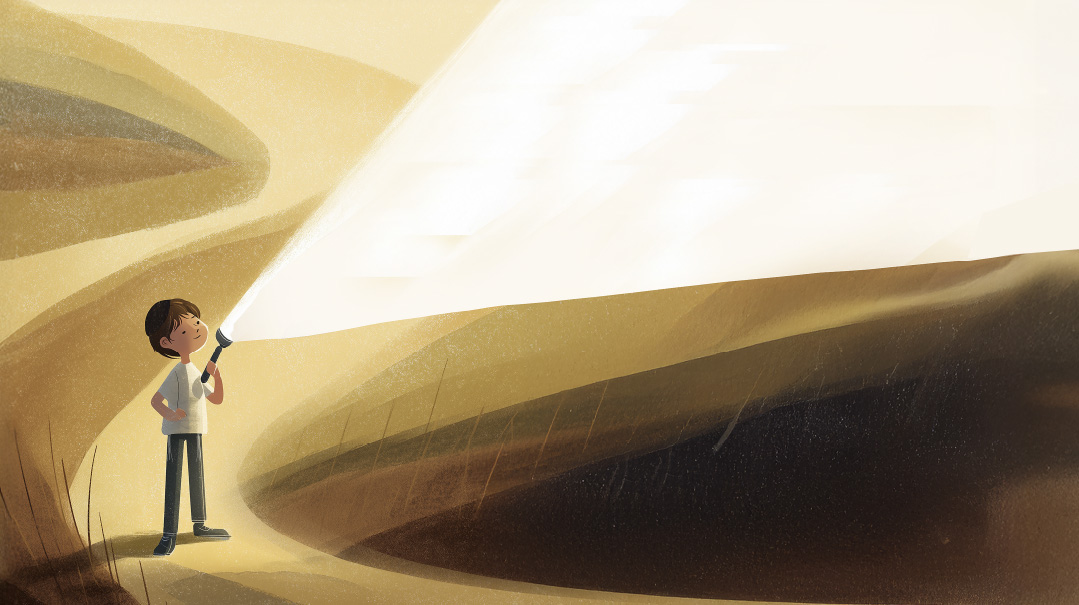Melody with Message
| August 9, 2022Chayala Neuhaus — the composer behind some of today’s most iconic songs, such as “A Yid” and “Miracles” — shares the story behind her songs

Sometimes I have to quiet the violins in my head,” says Chayala Neuhaus. “I can’t separate where I end and where music begins.” Her siblings have memories of her as a baby, crawling to the piano and humming along with the melodies they played.
“I was hungry for music,” she recalls. “I started formal training when I was five and when I got a tape recorder, that’s when it really took off for me.” The young musician spent hours tinkering at the piano as the small machine flashed "record." She kept going until she liked what she heard — and her very first songs began to emerge.
“My family took me seriously long before they had to,” Chayala shared. That support was paramount. It boosted her confidence so that she felt comfortable exploring.
Most creatives start as children who are creative and inquisitive — and hopefully, also confident and uninhibited, Chayala believes. “I wrote a lot of songs from when I was 11 until my twenties. Some were great. Most were horrible. But I’m so grateful I had time to let the music exist before my inner critic started chiming in with opinions. If I didn’t have that stage, I don’t think I could have developed skills the same way.”
When adults ask Chayala for advice in nurturing their own creativity, she tells them to recreate the innocent childhood dynamic. “You need to let yourself just go and go without shutting anything down.”
Black and White
To Chayala, the songs in her head were filled with color — while sheet music was black and white. She hated piano practice because of that. “I played by ear, so, focusing on classical technique wasn’t second nature,” she says. Instead, she liked to play around with the keys — making mistakes and making things up — until she stumbled upon that perfect combination of notes. “I wanted to just fly and create until I found something new and realized, ‘Hey, that melody is a keeper.’”
In retrospect, though, Chayala admits that, “My parents were smart. They had the piano teacher come every week even if I hadn’t practiced at all. Steadily, steadily, steadily, I learned to appreciate a process and structure.”
Chayala credits her parents with a lot of the foundational skills she now uses daily. “My father exposed us to such rich, diverse Jewish music. He and my mother gave us all kinds of opportunities as kids — things like music and gymnastics — and that’s something I pass on to parents who show up at my door, asking what to do with their children’s creativity.
“I always tell them to give their kids as many opportunities as possible. When you do, you give kids the chance to figure out, ‘Hey, I’m good at this,’ and ‘I’m probably not great at that.’ It builds confidence.”
Then, when they’re older, creatives can supplement the structure and processes. That’s why Chayala codified everything she learned over the years into digestible courses for frum women. It’s an easy way for everyone who has the creative instinct to learn the processes and structures that are vital to polished creations — composition, technicalities, client management, and more. More than 180 women around the world have graduated and are now engineering music of their own.
Young Composer
When Chayala was 11, a local school heard one of her songs and decided to use it for an upcoming program. They invited the sixth-grader to play it live at the high school assembly. “I barely reached the keyboard,” Chayala remembers. “It was the first time I realized, ‘Oh my, people are listening to my songs.’” It was an inkling of what would one day become her career.
When Chayala was in high school — as a student, not pianist, this time — she was on the shabbaton committee. A friend’s father agreed to help the girls prepare for the theme of “Shabbos” and set them up with stacks of seforim on the topic. After they’d spent hours delving into the topic, Chayala was inspired.
“I have to write a song about this,” she told her friends. And that night, she did. She found a small pad of paper and wrote page after page of lyrics. Then she laid the papers out on her bed and kept reordering — the chorus needs to go there, this line here — singing the melody to herself as she went. The next morning, Chayala showed up at school with “Im Atem Meshamrim,” which was later released on her debut album. She continued to compose over the years, with the occasional song for schools and camps. Then, less than a month before her wedding, Chayala got a call. Ruchy (Deutsch) Indig a”h from Camp Bnos was on the line. As a Bnos camper, Chayala had written several songs for her over the years. Now she wanted a new one.
“I’m getting married in three weeks,” Chayala said. “Nothing I write will be worth anything.”
“You can do it,” Ruchy said.
Chayala thought for a moment. “Fine,” she agreed. “What’s the theme?”
“Beauty in nature.”
Chayala sighed. Such a trite topic? “I don’t think I can do it.”
“Yes, you can,” Ruchy persisted.
And so, Chayala did. She came back a few days later and said, “Here’s your song, but don’t put my name on it. I don’t think it’s any good.”
Turns out, the song — “Miracles” — was pretty good. It spoke about renewal, how when you look outside every morning you see rebirth. And when you look inside to your soul, you see the same thing.
There’s one line that still makes Chayala laugh. “Ruchy insisted on having orchids in the song because the band at the production was called ‘orchidstra.’ I wrote about smelling the orchids, but orchids actually have no scent. I spent all of my twenties smelling orchids to confirm this — they have no smell.”
Although technically incorrect, Chayala kept the line as is when she produced her first album. “I just couldn’t change it,” she says. “As a creator, there’s sometimes this line that lodges itself in your head and you fight it and fight it, but it doesn’t go away. At a certain point, you need to just accept that it’s here to stay. You realize that you’re not the one creating. Hashem has something to send and you’re the messenger He’s choosing to send it through.”
Sharing the Music
In the years after her wedding, as she balanced new motherhood, Chayala did a lot of engineering and recording in her tiny home studio. One day, a little boy named Dovid Pearlman booked a session at her home to work on a curriculum project for an organization. Chayala had toyed with the idea of an album in the past, but if she recorded the songs herself, her compositions would be limited to a female audience. She was dreaming bigger. She wanted her songs to reach the hearts of both men and women worldwide.
“First and foremost, I’m a songwriter,” Chayala stresses. “So I’m always looking for something to say. If I write a song, it starts with the message. What’s worth singing about?” She starts with a feeling, develops it into thoughts, and then gives those thoughts words and a melody. It’s why most of her songs are in English and not derivatives of Hebrew pesukim.
Now, she wondered if Dovid could be the one to share those messages. “Dovid was just so great,” she says, remembering the first time she heard him sing. “I listened and realized that he would give the right voice to my songs.” That’s when the idea of releasing an album became a realistic dream. Later that year, Chayala put out Miracles I, a debut collection she refers to as, “the songs I received as gifts from Hashem.”
At the time, Chayala was a no-name composer with a limited marketing-and-production budget. But the CD sold. And it sold well. “It went well beyond what we expected,” she says. “People expected it to be for teen girls and maybe young families, but even grown men were listening to it on repeat.”
Since then, she’s released two more Miracles albums, produced by Doni Gross, the third of which was released this past Lag B’Omer. The songs are sung by Gavriel Pelcovitz, with a guest appearance by Benny Friedman on the song, “Odeh Lakel.” Miracles III is Chayala’s trademark collection of meaningful songs that touch on the full gamut of emotions.
All from Him
People often ask Chayala if she gets writer’s block, but she says she can’t — not when each song is a gift from Above. “I always used to push myself to write more, but I’m learning that Hashem doesn’t need you to push yourself to the brink. When a song comes out great, it’s easy to think, ‘Oh, I did amazing work,’ but it’s what Hashem gave me. And when a song doesn’t succeed, it’s the same acceptance of knowing it’s what Hashem wanted. When you trust that, you’ll be more confident to create — because you know you’ll be fine even if the song is an epic failure.
“While there is a process, there’s no perfect recipe. When I sit down, I have no guarantee that I’ll be able to create. I start each day saying, ‘Hashem, I have no idea why I wrote a good song last time, but if You want me to write a good song again, I’m here.’ It’s all from Him.
“I just need to keep showing up with my own hands on the piano.”
Chana’s Song
Sung by Devorah Schwartz
And the echo of her words / They are ringing out, they are heard / When women stand with outstretched hands / And the broken heart of mothers
“Chana’s Song” was created for a specific Bais Yaakov production about the story of Chana and her seven sons. To Chayala, Chana’s story holds a universal message of acceptance. “She didn’t want to give up her children, but it was Hashem’s Will and she listened when He asked.” With that thought in mind, Chayala wrote a heart-wrenching composition told from Chana’s perspective.
“When I played the final piece for the school, they were concerned that I wrote it in first person and got so personal about Chana’s story. They were worried the song was too vulnerable.”
Usually, Chayala listens to her clients. If they want a lyric changed, she’ll change it. This time, though, she couldn’t just let go. “I told them that I agreed — the song was messy and human. But there were countless women who lived throughout history and Chana’s story was recorded for a reason. We’re supposed to connect to it.”
Eventually, they came around to her way of thinking, and agreed to use “Chana’s Song” in its original form.
A few weeks later, Chayala got a call from an old camp friend, Shevy*.
Once upon a time, Shevy had the perfect life. “Everything was perfect, perfect, perfect until her first child was born with severe special needs. She needed to give up her career to be there for the child, so her husband left kollel.”
On the phone, Shevy told Chayala, “Remember when you sang ‘Miracles’ in camp? I’m still waiting for my miracle. Your song ‘Dirachecha’ is about a mother sending her child to learn Torah in yeshivah, but my son goes to public school and comes home with drawings of holiday ornaments. And remember the song you wrote about welcoming Shabbos with serenity and peace? When I light candles, I have three children pulling my skirt, another crying, and my house is a mess.
“I listen to your songs and wonder, ‘What happened? Where did I go wrong? My life doesn’t look like any of your songs.”
But then she heard “Chana’s Song” at the school’s production. “For the first time in my life, I felt so validated and seen,” Shevy said. “Like Chana, this isn’t the life I imagined, but it’s the life Hashem wants me to have. Your song is my reminder that my avodah is to accept Hashem’s Will.”
This One
Sung by Bracha Jaffe
I know you don’t feel like one / But you’re a hero for what you’ve done / And for this moment you won’t be unsung / This one goes out to you
“This One” was born as Chayala watched a close friend navigate an extremely difficult situation.
If you didn’t know what the woman was going through, it was easy to judge her actions and choices. At the time, Chayala was going through a difficult situation of her own with a sick family member. “I had an outpouring of support. People showed up at my door with dinners and iced coffees. Meanwhile, this friend struggled privately. Not only was no one showing up for her, she was going to get flak for her decisions.”
Once inspiration took hold, it took Chayala less than an hour to write the song.
The song wasn’t shiny with a polished happy ending. It’s honest, even raw. “It’s about realizing you need to stop equating results with what meets the eye. Each of us is doing exactly what we need to do. It may look ugly at times, but somewhere, in another realm, this is the most beautiful thing we can do.”
The world will never see you up on a billboard / Never name a building after you / And they’ll never find your star on a sidewalk / Saying this award goes to
And even those you fought for hardest / They may never ever get it / But I’m here to give you credit / This one time
“Some people have lives that look perfect, and other people have lives that look like a bunch of broken pieces. For some reason, this, with all the ugliness, is how He wants us to serve Him. The song is my way of saying that we see, understand, and recognize the hard times people go through.”
Chayala held on to the song for a few years. Many male singers came to her looking for material, but she didn’t offer “This One” to any. She didn’t think they could be raw enough to do the ballad justice.
For three years, the song had no home. Then Bracha Jaffe heard it. She turned to Chayala and said, “You wrote this song for me.”
The production team was worried though — the song was so long and structurally difficult. “We’re going to cut parts,” everyone agreed. They sat over the song for hours, but when it came down to it, no one could find a single line they were willing to let go. The song stayed exactly as it was.
Bracha recorded with a huge string orchestra in Europe and released the single in 2021. It was an immediate hit, with women commenting that it resonated with them.
Chayala receives daily messages asking, “How did you know my story?” from women who say they feel the song was written just for them.
A Yid
Sung by Benny Friedman
‘Cuz when it feels like the answer’s worlds away / We’ve got enough, more than enough to keep us going / We’re holding on to unbroken simple faith
Today, “A Yid” is sung in homes across the world. Originally, it was written for a Bais Yaakov production. “It was for a scene set in the Cantonist era after several boys were kidnapped. The song is about the Yidden getting up to rebuild atop the ruins.” It’s about how — even when it’s hard to look past the present destruction — we have the strength to carry on without breaking down. Hashem is standing there, helping us to keep going.
The school put on the production, then Covid hit. Doni Gross told Chayala, “People need the song. Let’s get it out there.”
First, Chayala needed to adjust some of the messaging to apply to current events.
“Making edits can be hard,” Chayala says about the changes. “There are so many levels of kinyan with a song — mine, the client’s, and the singer’s. The song was written one way for the school, but in order for it to reach a wider audience through Benny, we needed to make some tweaks. I consider these changes part of the song’s journey to get to the destiny Hashem decided.”
When they worked on the updated chorus, Chayala grappled with a question. “Why doesn’t a Yid break?” she asked whoever she could. “If you use logic or reason, we should have disappeared centuries ago. Why is this nation still around?”
During a conversation with a friend about parenting, Chayala stumbled upon the answer. The two were discussing the unbreakable connection between parents and children. Parents worry all the time about messing up, but if their child knows they are loved unconditionally, they will usually be okay. That’s when Chayala wrote the new ending of the chorus, “His Tatte loves him. That’s what a Yid holds on to.”
The new version of the song was released in February of 2021 just as people were emerging from months of disaster and attempting to reclaim a normal life. Chayala found it eerie that the scenario echoed the original scene of Jews emerging from the shadows of devastation.
The response to the song was unlike anything Chayala put out before. “It gave me a tremendous drive to keep composing,” Chayala says. “This is where I feel I have something to offer. Even if people don’t walk around with a sefer, they always have access to the messages of each song. I want to keep creating material that gives people messages in a pocket-sized way.”
Barcheinu
Sung by Mordechai Shapiro
K’ish echad b’lev echad/ My brother we’re one / Show the world how it’s done / Sing with me b’shalom
In 2018, Chayala was already known as the one-stop destination for songs. You could come to her home studio and get the composition, arrangement, and recording done in one place.
Mordechai Shapiro, who was working on material for his third album at the time, reached out to Chayala. He’d heard a song she composed for Bikur Cholim of Lakewood (“No Time Like Now,” sung by Benny Friedman) and loved it — did she have any songs for him?
Chayala’s “Barcheinu” went on Mordy’s next album. “It was a really big break for me,” Chayala remembers. “Miracles I was successful, and there’s a beauty in the fact that it was all mine, but this was the broader industry. It helped me break into a new market.”
Holding Back the Tides
Miracles II
No mighty wind or waves of roaring thunder / Can ever be strong enough to pull me under / I can feel their crushing power / But my ideals they can’t devour / The Ribbono shel Olam is holding back the tide
Chayala’s early songs are idealistic — the beautiful scene of a mother putting her children on the bus to cheder, a heartwarming melody about the calm and peace of welcoming Shabbos, an upbeat composition about tefillos always soaring straight up to Hashem.
Then, in 2017, Chayala’s family faced a tough medical situation and things began to shift. Life hit — hard — and Chayala realized that sometimes the world can get very, very messy before it straightens out. If it straightens out.
And that there’s no one to rely on but Hashem.
“You can see the shift in my music,” she points out. “The songs are less idealistic and more about picking yourself up when you fall.”
At one specific point during the long saga, Chayala was standing at the front desk of the hospital, waiting for someone to come help her. It was a huge facility — the building spanned a few floors — but anyone she asked said the situation was out of their hands. They couldn’t do anything for her.
Then Chayala remembered: there was a doctor she knew, one of the lead physicians. Maybe he could help. She texted the doctor and he immediately came down himself to sort things out.
“I remember watching him walk into the room and thinking that we rely on people in the lower positions to help, but Hashem is really the One Who gets the job done.” The epiphany was a huge turning point in her mindset, emunah, and songwriting.
Six months later, as Chayala was preparing for the seudas hoda’ah, she got a call from Chavi Ohayon at Bais Yaakov of Lakewood. “We need you to write our finale song. The theme is mesirus nefesh and how the Yidden held on to the Torah even during hard times.”
“Are you sure?” Chayala asked. She’d done that theme the year before, and the year before that. She didn’t think she could write a song about it again. A few days later, she was standing in front of the stove with one hand stirring soup for the seudas hoda’ah and another holding an Ein Yaakov. She was looking up a specific midrash Chavi had sent her.
It’s a conversation between two waves. One wave watched the other thrash against the shoreline and said, “Leave some shoreline for me. I also want the chance to destroy it.”
“What do you mean? I couldn’t consume the shoreline even if I wanted to,” the first wave said. “Don’t you know there’s an invisible hand holding me back?”
As Chayala read the midrash, the pieces of her life clicked together. She thought about the miracle her family was celebrating and realized; they were there to mark the occasion because Hashem had been there to protect them. He hadn’t let the hardship knock them over.
“After that, the song just splashed onto the page,” Chayala says. It was later released on Miracles II, featuring Yehuda Kirschner.
Broken Heart
Miracles III
I’m learning that there’s no one time or place / And that nobody’s too small to feel your embrace / And I am learning that you wait to hear my voice
“A lot of my songs are real and vulnerable, and sometimes listening means sitting with something that makes you slightly uncomfortable for a few minutes,” Chayala prefaced before explaining “Broken Heart,” one of her newest songs on Miracles III.
Chayala wrote the song after a conversation with a teenager who visited her studio. The girl always struggled with kriah, a challenge that plays into her relationship with davening.
“I can’t daven as fast as my class does, so my teacher hates me,” she said sadly. “How will Hashem answer my tefillos if He can’t hear them?”
Chayala thought about the standard approach to tefillah in the classroom. We think of davening as an equation: make a list, daven to Hashem, and then — if you daven strong enough — He’ll send all the items you requested. Point right at the word, sing the loudest, and you’re a super davener.
“But it’s not about that,” she told the young girl. “Tefillah is about connecting to Hashem, and He cares about what’s in our hearts.” She told the girl that, unlike her teacher who could only see if she pointed to the words, Hashem could see inside her heart. And sometimes letting Him into our broken heart is the most powerful connection of all.
“The song is about tefillah,” Chayala clarifies, “but it’s also about saying that even if you’re not the same as everyone else, you’re enough. Hashem wants us to serve Him as we are — even if you can’t read, even if you’re single, even if you don’t have children.”
One singer heard the song before it was released. And right there in Chayala’s studio, his tears began to fall. “It took me years to get a sense of self because I could never read well,” he explained. “I felt like my davening and learning was disqualified because I couldn’t do it the same way everyone else could.”
Finally, he felt understood — and recognized the wholeness in his brokenness.
(Originally featured in Family First, Issue 805)
Oops! We could not locate your form.







